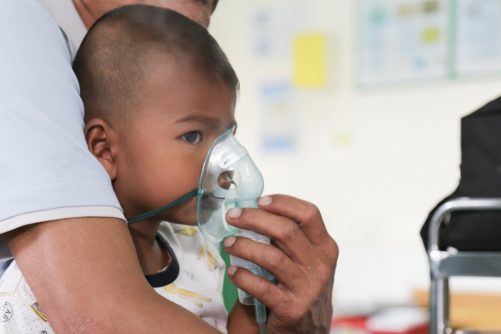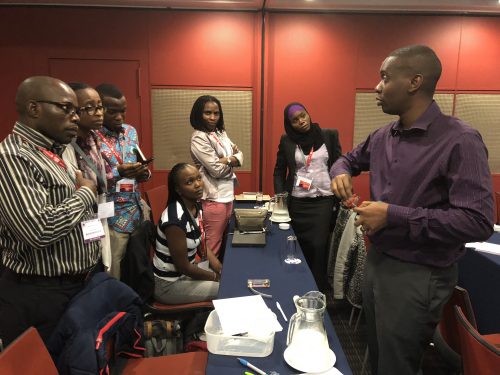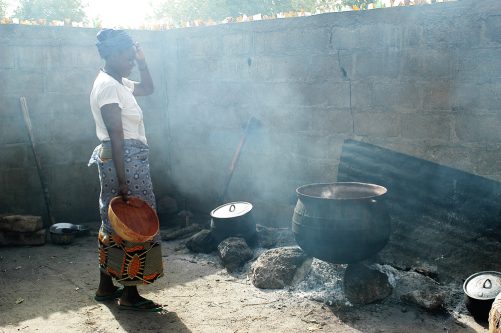By the Vital Strategies Environmental Health Division.
World Asthma Day (May 1) shines a light on a health condition that is perhaps the most commonly recognized by the general public as having a clinical and an environmental dimension. More than 300 million people around the world suffer from asthma, a chronic respiratory condition that is characterized by episodic wheezing, breathlessness, chest tightness, and coughing. Effective treatment to control underlying airway inflammation can help people with asthma to live full and active lives, but is not accessible or affordable in many in low- and middle-income countries. Just as challenging is severe — and in many cases worsening — air pollution exposure that exacerbates and may even cause new onset asthma and many other chronic health conditions, including COPD and cardiovascular disease.

Worsening air pollution exposure can exacerbate and even cause asthma
Health care providers in Africa, where household and outdoor air pollution combined caused about 750,000 premature deaths in 2016, are front line witnesses to air pollution’s devastating toll on patients. This role, while challenging, is also an opportunity for clinicians to act as thought leaders who elevate the importance of clean air policy in public discourse. To empower health care providers to respond to air pollution in their communities as clinicians and clean air advocates, Vital Strategies staff and partners* conducted an inaugural one-day air pollution workshop at the first combined Pan-African (PATS) and South African Thoracic Society (SATS) Congress meeting in Durban, South Africa. PATS and SATS represent two professional societies committed to promoting lung health “through education, training, research, and advocacy,” in Africa and South Africa, respectively.
The oversubscribed workshop welcomed more than 30 participants — mostly physicians from countries across Africa — to discuss the causes and health burdens of air pollution as well as how clinicians can help advocate and advance clean air solutions in their communities. Workshop faculty experts led sessions covering the major air pollutants and their sources, scientific evidence on health effects, and air quality monitoring methods, including hand-on demonstrations of low-cost equipment used in environmental health studies.

Participants at the workshop in Durban discuss the causes and health burdens of air pollution
The second half of the workshop addressed interventions and solutions. Faculty discussed the pros and cons of different solutions to household air pollution, clinician advice to patients, the basics of air quality management, and the relation of air pollution to climate change. The last session of the workshop consisted of an introduction to advocacy and communications, complemented by lively small group discussions on real examples of air pollution threats and potential control measures in Africa. The day concluded with a brief exercise on preparing for a media interview.
Air pollution levels and sources vary among African countries, but in many an important cause is the persistence of “traditional” pollution sources, like household burning of solid fuels such as wood, charcoal, dung, and crop waste, or kerosene for cooking, lighting or heating that exposes people to smoke at home and contributes a large measure of outdoor particle pollution. Open trash burning and traditional agricultural practices of open burning also play a role. Added to this are “modern” pollution sources driven by rapid growth of economies, industry, power generation, cities and motor vehicle fleets.

Household cooking is a major source of air pollution in Africa.
The complex challenge in many African countries of controlling sources of air pollution in the face of rapid economic development has been faced before in wealthy countries. Scientific knowledge and technologies developed to control pollution elsewhere can be applied to accelerate progress in Africa. One important need is better data to guide policies and investments. Government air quality monitoring across the African continent is sparse – non-existent in some countries – compared to North America, Europe and even China and India; data on pollution emissions is similarly limited. Innovative methods using satellite-based remote sensing and lower-cost monitors are beginning to fill some of these data gaps.
But even while data gaps remain, actions can be taken to address sources known to be highly polluting that have been integral to clean air progress in wealthy countries. Examples include investments and aid to rapidly expand access to clean household energy, including replacing polluting household fuels with clean technologies and fuels like solar-powered lights and LPG (liquified petroleum gas) or electric stoves for cooking. Other near-term priorities include raising fuel quality and vehicle emission standards to match those widely available in wealthy countries, and providing alternatives to open burning of trash.
Political will to invest, create and enforce regulations to clean the environment often requires pressure from civil society. In the fight for clean air, the value of mobilized healthcare workers is recognized by the World Health Assembly and promoted through the BreatheLife campaign, a clean air initiative led by the World Health Organization (WHO) and the United Nations (UN). The PATS/SATS air pollution workshop is just a first step in Vital Strategies’ efforts to align with these strategies and work with partners to empower clinicians worldwide as champions for the right to breathe clean air.
Learn more about Vital Strategies’ Environmental Health Division.
Follow along on Twitter using #AQAW2018, #BreatheLife2030 and #WorldAsthmaDay
*Faculty and affiliations: Workshop’s main faculty: Tom Matte (Vital Strategies), Sean Semple (University of Stirling), Elvis Ndikum (Framework Convention Alliance for Tobacco Control), John Balmes (University of California, San Francisco and Berkeley), Neil Schluger (Vital Strategies, Columbia University), Jonathan Grigg (Queen Mary University of London), Kevin Mortimer (Liverpool School of Tropical Medicine), Carisse Hamlet (Vital Strategies)
CityHealth Perspective is a blog series that examines the importance of urban policies and environments on public health. Urban interventions are a strategic focus for our work and a core strength of our team. With the majority of the world’s population now urban and an additional 2.5 billion urban dwellers anticipated by 2050, we believe that public health must play a stronger role in shaping future cities that advance human and planetary health.